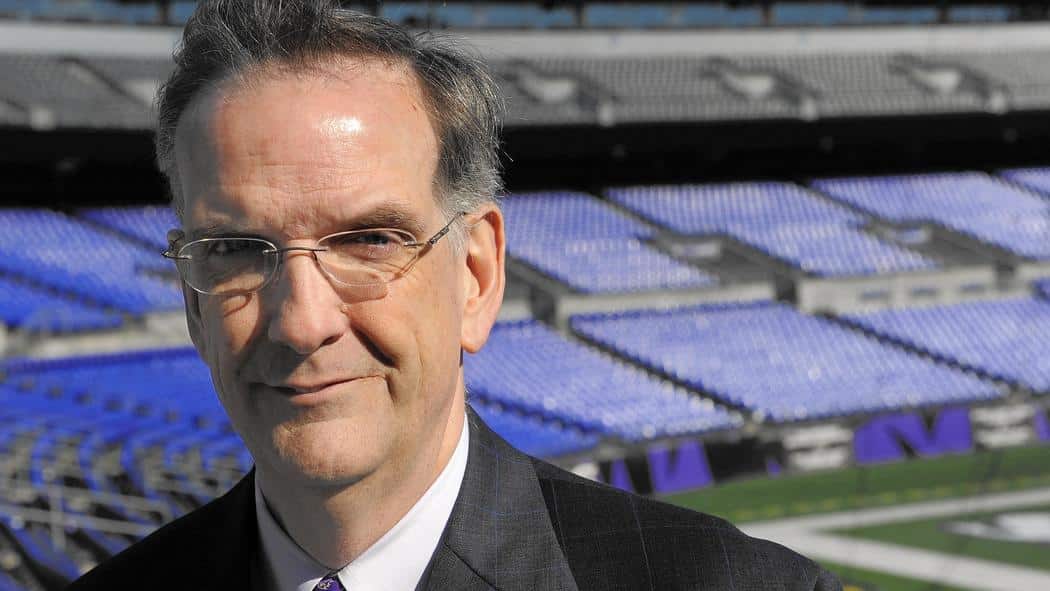
Baker Koppelman
Sr. Vice President of Ticket Sales & Operations
Baltimore Ravens
Baker Koppelman has seen firsthand the evolution of ticketing over his 37 years in the sports biz, and sometimes, he wonders if all the advances in technology tied to the lifeblood of operating events is worth it.
Koppelman, senior vice president of ticket sales and operations for the Baltimore Ravens, has worked for the NFL team since its first season in 1996 after relocating from Cleveland, Ohio. Before that, the Baltimore native spent eight years with the Orioles, plus a short stint with the San Diego Padres.
“I’m half joking when I say I’d like to go back and put some turnstiles back in place,” Koppelman said, referring to the switch to digital ticketing in sports. “The one thing I can’t wrap my head around is that for a million years, you had a paper ticket and they would tear your ticket and check the stub against the turnstile count. When the digital world came, we got scanners, which is great, but you’ve got nothing to check them against in case someone’s not doing their job and letting people through without scanning their ticket. That data is important and you want to know that it’s accurate.”
See: Full 2024 Ticketing Star Awards
Koppelman, a Baltimore native, speaks from experience through a career that included converting season-ticket holders on two separate occasions from old stadiums to new facilities, starting with the O’s move to Oriole Park at Camden Yards in 1992. Things ultimately got messy with a lot of fans upset with their seat locations at the new ballpark, according to Koppelman, and part of his job was to help fix the relocation process.
A few years later, after moving back to Baltimore from San Diego to work for the Ravens, Koppelman went through a similar situation, but with a few notable differences. The NFL team, which played its first two seasons at old Memorial Stadium while a new facility was under construction, had no season ticket holders, period. The Ravens started from scratch.
“The only thing we had going for us at that time was there was a campaign to get an expansion team in 1993,” he said. “There were several thousand people that had put deposits for season tickets that we reached out to. It was May (1996) and we started play in August. There was no internet, no online sales. It was hand-to-hand combat. We spent every day working until 1 a.m., then go home and come back at 9 a.m. to do it again. We got it done, but it was a little hectic.”
Two years later, in 1998, came the transition to the new 70,000-seat building, now M&T Bank Stadium. Koppelman said the process of relocating season-ticket holders was less nerve-wracking, because the Ravens had been through the process before of painstakingly “hand placing” every customer at the old venue. There were plenty of lessons learned from the past.
“We didn’t want to get crushed (with complaints) like we did at the Orioles,” he said. “The process of people being unhappy and fixing it is one thing, but there’s the perception of the toll it takes on the team, that you don’t know what you’re doing. Our goal was to make people feel good about us and their seats.”
Moving forward, Koppelman is now in charge of forming a marketing plan tied to the $430 million renovation of M&T Bank Stadium. Three new clubs will open over the next three years, most of which will be sold as add-ons for existing season-ticket holders for those premium spaces.
“If we have to bundle (amenities) down the road, we will,” he said. “We’ve got a lot of people in the lower level that could probably buy club seats, but they like their lower level seats. Now, they’ll have an opportunity to access a club in conjunction with their seats, which is pretty cool. We’ve got some flexibility with a strong season ticket base to work from.”
It helps that M&T Bank Stadium functions well from the standpoint of navigating the building. It’s user-friendly in that respect, Koppelman said.
“We’re so lucky that the (old owner) the Modells were in charge when they built that place,” he said. “They had 40 years of experience (with the Cleveland Browns) to draw from to build the perfect stadium in their mind. I like the fact that we’re sticking with it, even though it’s not going to be as fancy as some of these new stadiums today. This renovation is our attempt to catch up with that stuff; things that people want and expect in terms of hospitality.”






